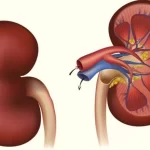What is liver cancer?
Liver cancer is additionally called hepatic cancer. there’s cancer that starts within the liver. When cancer develops within the liver, it destroys liver cells and interferes with the power of the liver to function normally. There are two sorts of cancer. Primary liver cancer, which begins in liver cells. Whereas, cancers that begin elsewhere and eventually reach the liver are called liver metastasis or secondary liver cancer.
Types of liver cancer
There are the following types of cancer-
- Hepatocellular carcinoma (Hepatocellular carcinoma) – Hepatocellular carcinoma, also known as hepatoma, is the most common type of HCC cancer that causes about 75 percent of cancer cases. HCC begins in the main types of liver cells, called hepatocellular cells. Most cases of HCC are due to infection with liver cirrhosis caused by Hepatitis B or C or alcohol.
- Fibrolamellar HCC – This is a rare type of HCC that is generally more susceptible to treatment than other types of liver cancer.
- Bile duct cancer – This cancer occurs in small, tube-like bile ducts within the liver that connect the bile to the gall bladder. It occurs in 10–20 percent of all liver cancers.
- Angiosarcoma – Angiosarcoma, also called hemangiosarcoma, occurs in about 1 percent of cancer cases. It starts in the blood vessels and accelerates quickly.
- Liver metastasis – This cancer develops when cancer spreads from another part of the body to the liver. Most liver metastases originate from the colon. More than half of people with colon cancer also develop liver metastasis.
Early Symptoms of liver cancer
Most people do not have some symptoms of cancer in the primary stage but when they occur, it may include the following symptoms:
- jaundice: Jaundice is not a disease, it is a sign that your liver is not functioning properly. Jaundice occurs when the amount of bilirubin in the body becomes high. This is the first symptom of cancer.
- Weight loss: The stomach is the main organ of the body that helps the body metabolize, its ability to function at the beginning of cancer, which the metabolism does not work properly, and leads to weight loss.
- Nausea or vomiting and fatigue: If someone has nausea and vomiting all the time, they need to pay more attention to themselves, the patient feels nausea and vomiting at the onset of cancer. At the beginning of cancer, due to a lack of liver function of the patient, the body gets tired soon and always feels heavy.
- Liver enlargement and itching: The liver is situated on the straight side of your stomach, it is natural for liver cancer to change in size, it becomes somewhat larger. If there is more itching in the abdomen, do not ignore it. It is one of the primary systems of cancer. The skin is itchy due to increased bilirubin.
- Abdominal Pain and Acitis: As the liver grows, pain starts in the stomach, which is also the primary symptom of cancer. Acetic or fluid acclimation is the strongest symptom of cancer which determines whether a person is vulnerable to liver cancer.
- Dark-colored pee: When the amount of bilirubin in the body is high, it is released from the urine through the blood, which makes the color of urine dark. If a person has understood the above-mentioned symptoms in his body for the past several days, and he also has more yellow urine, go to the doctor soon.
Stages of liver cancer
There are the following four stages of cancer-
- The first stage of cancer means that the tumor has not developed in the blood vessels and cancer has not spread to nearby lymph nodes or elsewhere.
- The second stage means that the tumor has developed into blood vessels or several small tumors (all smaller than 2 inches) have developed and cancer has not spread to nearby lymph nodes or elsewhere.
- The third stage of cancer consists of the following three sub-types- First – This means that many tumors are present and at least one is larger than 2 inches (5 cm) and cancer does not spread to nearby lymph nodes or elsewhere. Second – This means that many tumors are present and at least one tumor is growing in one branch of the pulse and cancer does not spread to nearby lymph nodes or elsewhere. Third – This means that the tumor has spread to a nearby organ (other than the gall bladder) or the outer covering of the liver and has not spread to nearby lymph nodes or elsewhere.
- The fourth stage is the most advanced stage of cancer. In this, cancer spreads to nearby lymph nodes and can grow in nearby blood vessels or organs. Advanced liver cancer often does not spread to distant organs but when it does, it is likely to spread to the lungs and bones.
Causes
- Severe infection of hepatitis B or C
- Cirrhosis
- Diabetes
- Liver fatty being.
- Thickening.
- Smoking or consumption of alcohol.
- How to get a diagnosis
- To find out about cancer, you’ll determine by doing a CT or MIR scan, liver biopsy or biopsy, etc.
Treatment
Surgery: Surgery is additionally wiped out cancer of the liver. The cancerous liver is removed during this. this is often done if there’s a little tumor within the liver. But there could also be a risk of excess bleeding.
Liver transplant: In this transplant, the doctor removes the cancerous liver and replaces it with a healthy liver. this is often done then. When cancer has not spread to the other organ.
Absorption: These are injected to eliminate cancer cells. This makes the patient unconscious. so that he doesn’t feel pain. it’s beneficial for those that haven’t had surgery or liver transplant.
Radiation therapy: Radiation with heart energy is employed in it. thanks to which cancer cells are destroyed. But it also has more side effects. this might cause skin problems, vomiting problems.
Chemotherapy: Chemotherapy kills cancer cells. it’s given through medicines. it’s very effective in liver cancer but thanks to its medicines, the patient has got to face many problems including vomiting, loss of appetite, or chills.






